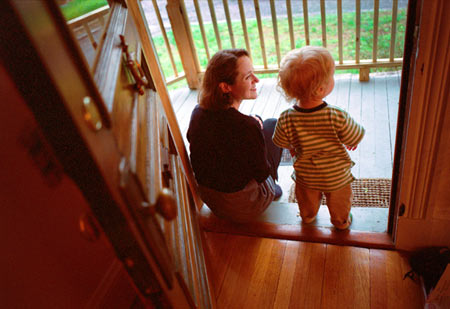‘Democracy works, and you can get stuff done’
Public health activist, M.D., mother, Drye intends to improve U.S. health care policy

Elizabeth Drye has a simple philosophy – do what you’re interested in and follow the opportunities. She’s interested in so many things that this has led to a complex life – Stanford University, Harvard School of Public Health, Congress, the White House, Harvard Medical School, and motherhood.
Slight, youthful, irrepressible, fast-talking, it took Drye, who just turned 40, an hour to describe where she’s been and what she’s going to do. It’s a good story.
“I want to use my training in public health and medicine, together with eight years of experience in Washington, to be a good mother, a caring pediatrician, and to help change health policy in the United States,” she says.
Her first interest was in human biology, not surprising with a psychiatrist father and a physical-therapist mother. In her sophomore year at Stanford University, Drye entered the school’s human biology program. “I knew immediately that I had chosen right,” she says.
Her parents also gave her an interest in public policy and politics, so she did a concentration in health policy. After graduating in 1984, she faced the choice of medical school or studying public health. Because of the many years involved in medical school and her growing interest in policy, Drye chose the Harvard School of Public Health (SPH). “There was so much I wanted to learn about the health policy process that I was eager to get involved as soon as possible,” she notes.
Getting stuff done
After graduation from the SPH in 1988, Drye applied for work at the Environmental Protection Agency (EPA). “I thought that I would stay there only a year or two,” she says, “but doors kept opening to interesting things.” After working at the EPA on policy planning and evaluation for four years, she got an opportunity to work for Sen. Joseph Lieberman, D-Conn., first as a congressional fellow and then as a legislative assistant for social policy. During that time, Drye participated in the well-known health-reform debate of 1993-94.
“I worked on a comprehensive bill championed by a coalition of moderate Democrats and Republicans,” Drye recalls. “It was not as conservative as the Republican plan or as far-reaching as the one offered by President Clinton. After considerable debate, it was a last hope for a compromise, but it, too, went down to defeat.”
Nevertheless, she refers to the experience as “amazing – the most important and rewarding thing I had done up to that time. Senator Lieberman was a wonderful, supportive mentor.”
In 1996, Drye was recruited to the White House Domestic Policy Council, where she worked on health policy, tobacco policy, food safety, and cloning legislation. She describes working in the White House as “intense, not as warm and fuzzy as Senator Lieberman’s office, but a rewarding once-in-a-lifetime happening.”
Washington left a good impression on Drye. “I learned that without connections or money I could get involved and make a difference,” she says. “The better the work I did, the more responsibility I received. I participated in democracy in ways I never thought I could. Democracy works, and you can get stuff done.”
Baby policies
Although she was able to help advance legislation and regulations that improved the health of Americans, Drye’s interests shifted. “I did not want to spend my whole life in Washington,” she explains. “I was getting consumed by immediate deadlines and short-term goals. I continued to be deeply interested in medicine, and I wanted to serve children and families more directly.”
Drye knew that the best way to do that was to be a physician. It would take long years and be expensive, but Drye, then 35, made the tough decision to go to Harvard Medical School. “It was a hard five years, but I’m glad I did it,” she comments. “I won a four-year scholarship before I started, but I would have gone anyway.”
At the Medical School, Drye worked with Barbara McNeil, Ridley Watts Professor of Health Policy, to set up a series of lectures on health care policy for students. “It was a way to give something back from what I learned in Washington,” she says.
Drye also trained at a Spanish-speaking community health center and at a clinic for teenaged mothers based at Children’s Hospital in Boston. “I loved caring for the mother and baby together,” she says. “From there, it was an easy decision to go into pediatrics.”
By that time, Drye was pregnant herself. While in Washington, she had gone on a blind date with Jerry Mande, who worked for Vice President Al Gore on public health issues. They married in June 1999, after her second year of medical school. Their first son, Thomas, was born 20 months ago.
Drye has a second baby due in November, and this will affect the course of her medical residency. “I didn’t want to be pregnant during my internship,” she says, “so I’m taking a year off to do research.”
The research will take Drye and her husband to Yale Medical School. Jerry worked for David Kessler when Kessler headed the Food and Drug Administration. He is now dean of Yale Medical School, and the couple will both work with him – Elizabeth on a book about prevention of cancer, stroke, and heart disease. When she is ready, Elizabeth hopes to do her pediatric residency at Yale Medical School.
“During residency, I want to build a foundation for a career caring for patients, advancing health policy, and advocating for children,” Drye states. After talking with her, you don’t doubt that she’ll be able to do all of these things simultaneously.




